Other years |
| Countries of the United Kingdom |
| Scotland |
| Sport |
| 1783 English cricket season |
Events from the year 1783 in Great Britain. This year is notable for the conclusion of the American Revolution.
Other years |
| Countries of the United Kingdom |
| Scotland |
| Sport |
| 1783 English cricket season |
Events from the year 1783 in Great Britain. This year is notable for the conclusion of the American Revolution.


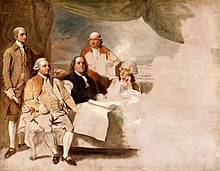

1783 (MDCCLXXXIII) was a common year starting on Wednesday of the Gregorian calendar and a common year starting on Sunday of the Julian calendar, the 1783rd year of the Common Era (CE) and Anno Domini (AD) designations, the 783rd year of the 2nd millennium, the 83rd year of the 18th century, and the 4th year of the 1780s decade. As of the start of 1783, the Gregorian calendar was 11 days ahead of the Julian calendar, which remained in localized use until 1923.
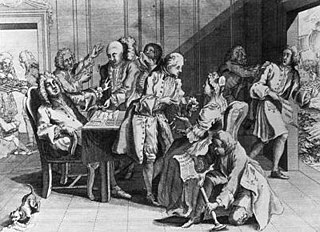
1738 (MDCCXXXVIII) was a common year starting on Wednesday of the Gregorian calendar and a common year starting on Sunday of the Julian calendar, the 1738th year of the Common Era (CE) and Anno Domini (AD) designations, the 738th year of the 2nd millennium, the 38th year of the 18th century, and the 9th year of the 1730s decade. As of the start of 1738, the Gregorian calendar was 11 days ahead of the Julian calendar, which remained in localized use until 1923.

George III was King of Great Britain and Ireland from 25 October 1760 until his death in 1820. The Acts of Union 1800 unified Great Britain and Ireland into the United Kingdom of Great Britain and Ireland, with George as its king. He was concurrently Duke and Prince-elector of Hanover in the Holy Roman Empire before becoming King of Hanover on 12 October 1814. He was a monarch of the House of Hanover, who, unlike his two predecessors, was born in Great Britain, spoke English as his first language, and never visited Hanover.

William Pitt was a British statesman, the youngest and last prime minister of Great Britain from 1783 until the Acts of Union 1800, and then first prime minister of the United Kingdom from January 1801. He left office in March 1801, but served as prime minister again from 1804 until his death in 1806. He was also Chancellor of the Exchequer for all of his time as prime minister. He is known as "Pitt the Younger" to distinguish him from his father, William Pitt the Elder, who had also previously served as prime minister.
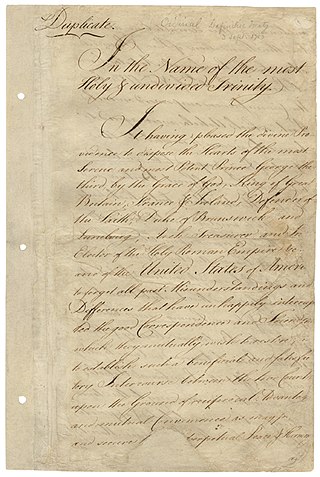
The Treaty of Paris, signed in Paris by representatives of King George III of Great Britain and representatives of the United States on September 3, 1783, officially ended the American Revolutionary War and recognized the Thirteen Colonies, which had been part of colonial British America, to be free, sovereign and independent states.
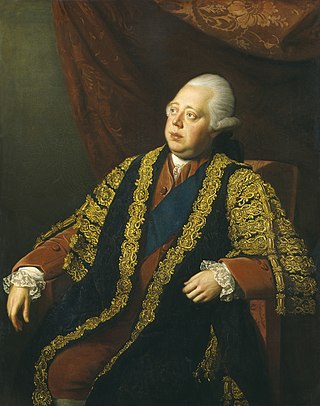
Frederick North, 2nd Earl of Guilford, better known by his courtesy title Lord North, which he used from 1752 to 1790, was Prime Minister of Great Britain from 1770 to 1782. He led Great Britain through most of the American War of Independence. He also held a number of other cabinet posts, including Home Secretary and Chancellor of the Exchequer.

William Henry Cavendish Cavendish-Bentinck, 3rd Duke of Portland, was a British Whig and then a Tory politician during the late Georgian era. He served as chancellor of the University of Oxford (1792–1809) and as Prime Minister of Great Britain (1783) and then of the United Kingdom (1807–1809). The gap of 26 years between his two terms as prime minister is the longest of any British prime minister. He was also an ancestor of King Charles III through his great-granddaughter Cecilia Bowes-Lyon, Countess of Strathmore and Kinghorne.

William Petty Fitzmaurice, 1st Marquess of Lansdowne,, was an Anglo-Irish Whig statesman who was the first home secretary in 1782 and then prime minister in 1782–83 during the final months of the American War of Independence. He succeeded in securing peace with America and this feat remains his most notable legacy.

The Fox–North coalition was a government in Great Britain that held office during 1783. As the name suggests, the ministry was a coalition of the groups supporting Charles James Fox and Lord North. The official head was William Cavendish-Bentinck, 3rd Duke of Portland, who took office on 2 April 1783.
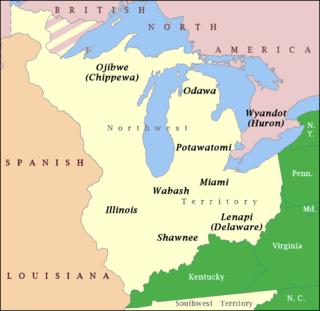
The Northwestern Confederacy, or Northwestern Indian Confederacy, was a loose confederacy of Native Americans in the Great Lakes region of the United States created after the American Revolutionary War. Formally, the confederacy referred to itself as the United Indian Nations, at their Confederate Council. It was known infrequently as the Miami Confederacy since many contemporaneous federal officials overestimated the influence and numerical strength of the Miami tribes based on the size of their principal city, Kekionga.
Events from the year 1801 in the United Kingdom. The Acts of Union 1800 came into force this year.
Events from the year 1809 in the United Kingdom.

Events from the year 1778 in Great Britain.
Events from the year 1800 in Great Britain.
Events from the year 1782 in Great Britain. The American Revolutionary War draws to a close.

The Peace of Paris of 1783 was the set of treaties that ended the American Revolutionary War. On 3 September 1783, representatives of King George III of Great Britain signed a treaty in Paris with representatives of the United States of America—commonly known as the Treaty of Paris (1783)—and two treaties at Versailles with representatives of King Louis XVI of France and King Charles III of Spain—commonly known as the Treaties of Versailles (1783). The previous day, a preliminary treaty had been signed with representatives of the States General of the Dutch Republic, but the final treaty which ended the Fourth Anglo-Dutch War was not signed until 20 May 1784; for convenience, however, it is included in the summaries below.
Diplomacy was a central component of the American Revolutionary War and broader American Revolution. In the years leading up to the outbreak of military hostilities in 1775, the Thirteen Colonies and Great Britain had sought a peaceful diplomatic solution within the British political system. Once fighting began, diplomacy in the American Revolutionary War became critical to each faction for both strategic and ideological reasons. The American colonists sought forward aid and support to counter Great Britain's overwhelming strategic, military, and manpower advantages as well as to garner political legitimacy through international recognition; Great Britain sought to contain these diplomatic overtures while also leveraging its foreign relations with Native American tribes and German states. The American Declaration of Independence in July 1776 escalated these developments as the erstwhile sovereign United States evolved an independent foreign policy. Diplomacy would prove critical to shaping the trajectory and outcome of the war, as Americans relations with several foreign powers—particularly France and Spain—allowed access to decisive war material, funds, and troops while at the same time isolating Britain globally and spreading thin its military.
Events from the year 1782 in the United States
Events from the year 1783 in the United States. The American Revolution officially ended with the Treaty of Paris.